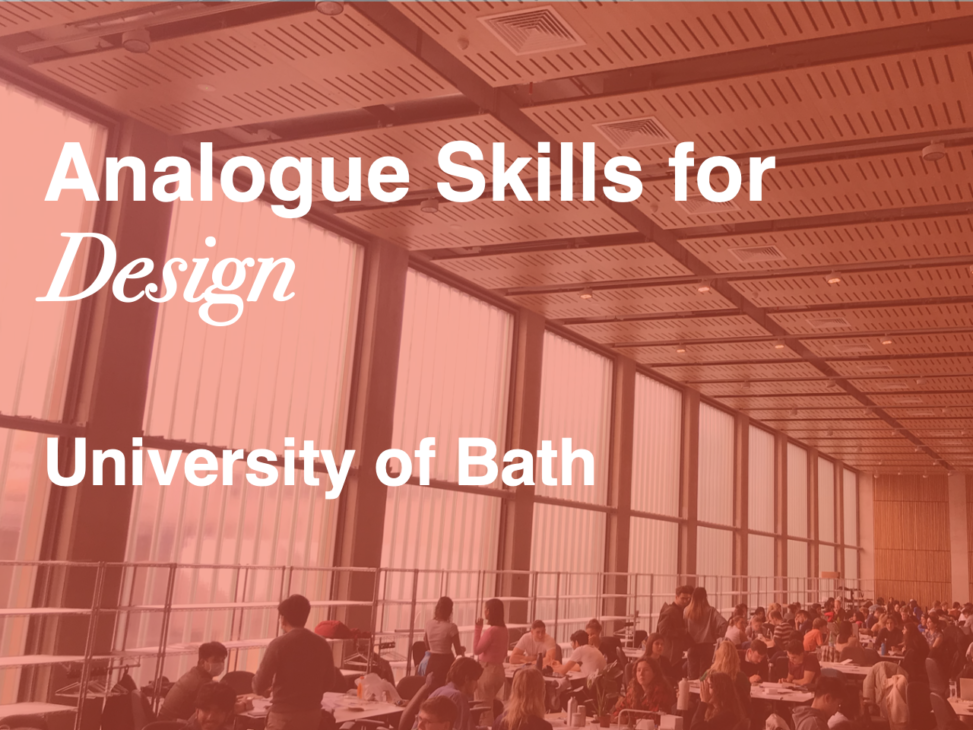Today at the University of Bath I am running a workshop on Analogue Skills for Design. This workshop fuses material from my conceptual design teaching with my observations from the Analogue Skills project, my attempt to collect and curate less digital ways of doing things in case we need to use them again.
Creativity and design as human skills
A key thread that runs through my design and creativity teaching is that these are very human processes, which are deeply impacted by individual’s connection to themselves, each other and the environment which supports them.
At the individual level, creativity is hugely influenced by our emotional and physiochemical state, the relationship between our conscious and subconscious and our unique combination of lived experience. At a group level, how ideas emerge in a collective consciousness and become the work of many is influenced by relationships, accessibility and the many facets of working culture. And of course we all live in the physical world, the world that we are trying to shape. How we move through and experience that physical world – not in our heads but as moving inhabitants of space – influences how we respond to and act in that space.
All of these factors are features of how we design, not as purely rational, reason engines, but as emotional, physical human beings.
Analogue Skills
Another ability of humans – although not unique to humans – is the ability to create tools. Taking a lever as both an example and a metaphor, our tools enable us to multiply our efforts. The tools we use shape our perception of what is possible, and so influence how we perceive the world.
Over the last five years or so I have become increasingly interested in how our tools, and in particular our newer, digital tools influence how we think and live. Because while we have always been influenced by our tools, the rate of introduction of new, digital tools has become so rapid that in less than a generation, our tools have transformed the way we think, feel and behave.
I experience this personally because I am a Xennial, someone from a sub-generation that grew up without internet enabled computers but who has spent their whole working life with one. Xennials are halfway between digital natives and digital immigrants. I feel this timing of my up-bringing gives me insight into two different ways of thinking, what I loosely call the more analogue and the more digital. These two ways of thinking can be very different. Take the simple example how to organise information. In the analogue world, information is carefully indexed and prized because it may not be possible to find it again. It is a paradigm of scarcity but also care. In the digital world, the natural assumption is the information is searchable and always available and so information itself is de-valued. This is a paradigm of abundance but also of less care.
From this perspective, individuals become more and more dependent on these new technologies, I see that what once was a tool that served us, these technologies have become a tool to manipulate us. From user to used. With dependency comes fear. How could I ever live without it? But so ubiquitous is our internet-enabled world that we risk forgetting the ways we could live and flourish without computers in our pockets.
The Analogue Skills Project is my attempt to record less-digital ways of doing things before they get forgotten so that we can use these to evaluate what technology we do and don’t want. It is an attempt to build resilience and reduce dependence on technology that may not always be there to help us. It is my hope to find a more human balance between the analogue and the digital.
See my collection of analogue skills so far.
Human operating system
I see each analogue skill as a way of liberating ourselves from digital dependency and to discover something that it turns out we can do ourselves as humans: each one is a clue to the workings of the human operating system.
To accompany the growing list of skills I have also created the Analogue Skills Manifesto, which is an invitation to resist the digital pull and rediscover what you can do as a human being:
- Don’t delegate autonomy to the machines
- Resist a mediated experience
- Resist life as content
- Re-discover old tech
- Much less is much more
- Welcome uncertainty
- Don’t get things done
- Share, swap and learn from others
- Relish company
- Seek nourishment in time alone
- Embrace friction, embrace inconvenience
- Forget the unimportant and remember the valuable
- Ground yourself and find your bearings
- Use your hands and your senses
- Concentrate
- You have everything you need.
Analogue Skills in Design
Bringing these two themes of work together, what are the analogue skills that we bring to design that we risk forgetting if we don’t use them, and are worth rediscovering if they have already slipped away?
Looking through my design teaching deck, there are many concepts which are already analogue, and so I am putting them together here:
These are skills that we are going to experiment with today. These are things that you can do because you are human. There isn’t going to be a software upgrade. You don’t have to pay a license fee. You can share these tools with whoever you like, and when the internet goes down, you will still be designing. I should also add that these tools don’t stop you from using digital tools – they are here to help you choose.


Leave a Reply